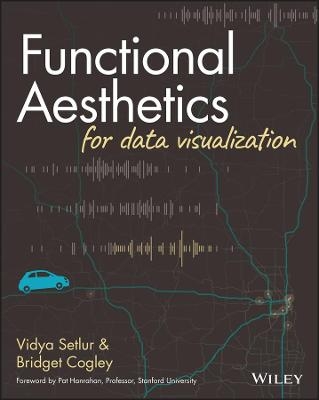
Functional Aesthetics for Data Visualization
John Wiley & Sons Inc (Verlag)
978-1-119-81008-7 (ISBN)
Drawing from their unconventional backgrounds, these two women take readers through a journey around perception, semantics, and intent as the triad that influences visualization. This visually engaging book blends ideas from theory, academia, and practice to craft beautiful, yet meaningful visualizations and dashboards.
How do you take your visualization skills to the next level? The book is perfect for analysts, research and data scientists, journalists, and business professionals. Functional Aesthetics for Data Visualization is also an indispensable resource for just about anyone curious about seeing and understanding data. Think of it as a coffee book for the data geek in you.
https://www.functionalaestheticsbook.com
VIDYA SETLUR, PhD, is the head of Tableau Research. She earned her doctorate in Computer Graphics in 2005 at Northwestern University. Her expertise is in natural language processing and computer graphics, and she seeks to develop new algorithms and user interfaces that enhance communication and understanding. BRIDGET COGLEY is the Chief Visualization Officer at Versalytix and is a Tableau Hall of Fame Visionary. As an American Sign Language interpreter turned analyst, her practice incorporates semantics to draw meaning in her designs. She focuses on innovative use cases in data visualization.
Acknowledgments ix
About the Authors xi
About the Technical Editor xii
Foreword by Pat Hanrahan xiii
Introduction xv
Part A: Perception 1
Chapter 1: The Science Behind Perception 3
Seeing and Understanding Imagery 3
Color Cognition 6
Saccade and Directed Attention 10
The Notion of Space and Spatial Cognition 11
Diagramming the World 13
Summary 20
Chapter 2: Perception in Charts 21
Visualization and Task 23
Chart as an Informational Unit 24
Unboxing Functional Aesthetics in the Physical World 27
Recursive Proportions 28
The Digitized Space: Creating Experiences on the Screen 31
Summary 34
Chapter 3: Charts in Use 35
The First Charts 36
Standardizing Visualization 40
The Shifting Role of Data Visualization 43
Maturity within the Profession 49
Summary 56
Part B: Semantics 57
Chapter 4: Coming to Terms 59
Statistical Graphics Are Inherently Abstract 60
Flattening the Curve 63
Toward Meaningful Depictions 65
Situating with Semiotics 68
Summary 69
Chapter 5: Vagueness and Ambiguity 71
How Tall Is Tall? 71
Spicy or Hot—What’s
the Difference? 76
Clarification, Repair, and Refinement 78
Iconicity of Representation 80
The Art of Chart 82
Summary 85
Chapter 6: Data Literacy 87
Navigating Data Literacy 89
The Impact of Writing 90
Data Orality 92
Changing Exposition Styles 96
Data Literacy Democratization 97
Summary 99
Chapter 7: Data Preparation 101
Hairy Dates 102
Common Transformations 103
Clarity in Conversation 107
Shaping for Intent 109
Prepping for the Future 110
Data Enrichment 113
Summary 115
Chapter 8: Scaling It Down 117
Generalization 118
Natural Sizes 119
Fat Fingers and Small Screens 120
Color as a Function of Size 123
Thumbnails and Visual Summaries 124
Summary 128
Chapter 9: Cohesive Data Messages 129
Cohesion in Designing Visualizations 131
Analytical Conversation 144
Summary 152
Chapter 10: Text and Charts 153
Medium Being the Message 154
Types of Text 155
Balancing Text with Charts 161
Chart and Text Agreement 163
Text in Analytical Conversation 166
Making Data More Accessible 168
Text for Supporting Reading Fluency 170
Summary 171
Part C: Intent 173
Chapter 11: Defining and Framing 175
Analytical Intent 176
Register 178
Repair and Refinement 179
Pragmatics 181
Practicing Intent 182
Summary 185
Chapter 12: Visual Communication 187
Do What I Mean, Not What I Say 189
Register in Charts 192
Registers in Composition 194
Mood and Metaphor 197
Beyond Language Communication 197
Expansion and Contraction 200
Summary 201
Chapter 13: Scaffolds 203
Visualization Scaffolding 206
Scaffolding Data Discovery 210
Scaffolding Natural Language Recommendations 213
Analytical Conversation to Repair and Refine 217
Summary 221
Chapter 14: Balancing Emphasis 223
Individual Choices 224
Collective Choices 225
Correcting Common Problems 228
View Snapping 232
Summary 238
Chapter 15: Mode 239
Navigate Like a Local 241
Revisiting Analytical Chatbots 247
Video Killed the Radio Star 249
Beyond the Desktop 251
Future Forward 255
Summary 257
Part D: Putting It All Together 259
Chapter 16: Bringing Everything Together 261
Addressing the Paper Towel Problem 263
Crafting Recipes for Functional Aesthetics 267
Summary 286
Chapter 17: Close 287
Data in Everything and Everywhere 288
New Tools and New Experiences 295
Sign-off 297
Technical Glossary 299
Index 305
| Erscheinungsdatum | 28.06.2022 |
|---|---|
| Verlagsort | New York |
| Sprache | englisch |
| Maße | 185 x 236 mm |
| Gewicht | 680 g |
| Themenwelt | Mathematik / Informatik ► Informatik ► Datenbanken |
| Informatik ► Software Entwicklung ► User Interfaces (HCI) | |
| ISBN-10 | 1-119-81008-6 / 1119810086 |
| ISBN-13 | 978-1-119-81008-7 / 9781119810087 |
| Zustand | Neuware |
| Informationen gemäß Produktsicherheitsverordnung (GPSR) | |
| Haben Sie eine Frage zum Produkt? |
aus dem Bereich


